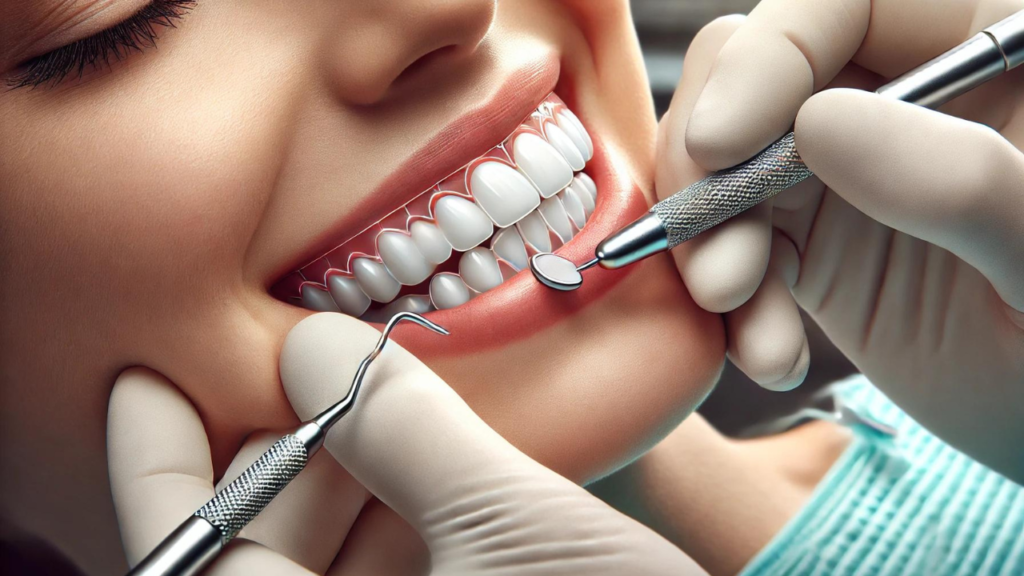Table of Contents
ToggleIntroduction
Pregnancy is an exciting and life-changing journey for many women. However, it also brings unique health challenges, including oral health concerns. Taking care of your teeth and gums is essential during this period, as hormonal changes can increase the risk of certain dental problems. This article will explore the importance of dental care during pregnancy, the types of treatments that are safe, and tips for maintaining good oral hygiene.
Why Oral Health Matters During Pregnancy
Impact of Hormonal Changes on Oral Health
Hormonal changes during pregnancy can affect the gums and teeth. Increased levels of progesterone and estrogen can cause gums to become more sensitive, leading to conditions like gingivitis. This condition, marked by swollen and bleeding gums, affects up to 60-70% of pregnant women.
Connection Between Oral Health and Overall Pregnancy Health
Poor oral health during pregnancy has been linked to complications such as preterm birth and low birth weight. Research suggests that untreated gum disease may contribute to these risks. Keeping your mouth healthy can help support a healthier pregnancy.
Common Dental Issues During Pregnancy
- Pregnancy Gingivitis: Inflammation of the gums caused by hormonal changes.
- Tooth Decay: Changes in diet, such as increased snacking, can contribute to cavities.
- Pregnancy Tumours: Small, non-cancerous growths on the gums that may develop due to irritation or plaque buildup.
Safe Dental Treatments During Pregnancy
First Trimester Considerations
While it’s safe to visit the dentist at any time during pregnancy, many dentists prefer to delay non-urgent treatments until the second trimester. The first trimester is when the baby’s major organs develop, and reducing stress during this time can be beneficial.
Treatments Recommended in the Second Trimester
- Dental Cleanings: Routine cleanings can help prevent gum disease and remove plaque.
- Fillings: Treating cavities early prevents more significant issues later.
- Periodontal Care: Addressing gum problems during this stage can help maintain overall oral health.
Third Trimester Precautions
During the third trimester, lying on your back for extended periods may be uncomfortable. Dentists may adjust procedures or use cushions to make you more comfortable. Emergency treatments, such as addressing tooth pain or infections, remain safe and essential.
Dental X-Rays During Pregnancy
Many women worry about dental X-rays during pregnancy, but modern technology makes them safe. Lead aprons and thyroid collars provide extra protection, shielding both the mother and the baby from radiation. If an X-ray is necessary, the benefits often outweigh any minimal risks.
Tips for Maintaining Oral Health During Pregnancy
Brushing and Flossing Habits
Brush your teeth twice a day with fluoride toothpaste and floss daily. These habits help remove plaque and reduce the risk of cavities and gum disease.
Managing Morning Sickness
Morning sickness can expose your teeth to stomach acid, which weakens enamel. After vomiting, rinse your mouth with water or a mixture of baking soda and water to neutralise the acid. Avoid brushing immediately, as it can wear down softened enamel.
Healthy Eating for Strong Teeth
A balanced diet supports both your oral health and your baby’s development. Focus on foods rich in calcium, like dairy products, leafy greens, and fortified cereals. Limit sugary snacks and drinks, as they can increase the risk of tooth decay.
Regular Dental Visits
Keep up with your regular dental check-ups during pregnancy. Inform your dentist that you are pregnant so they can tailor their care to your needs. Early intervention can prevent minor issues from becoming major problems.
Myths About Dental Care During Pregnancy
Myth: Dental Treatments Harm the Baby
Fact: Most dental treatments are safe during pregnancy. Avoiding necessary care can lead to more serious problems that could impact your overall health.
Myth: Bleeding Gums Are Normal and Should Be Ignored
Fact: While gum sensitivity increases during pregnancy, persistent bleeding should be addressed. It may indicate gum disease, which requires professional care.
Myth: You Can’t Use Local Anaesthesia
Fact: Local anaesthesia is safe and effective for most dental procedures during pregnancy. Your dentist will choose options that are safe for you and your baby.
When to Contact Your Dentist
Certain symptoms should prompt an immediate visit to the dentist. These include:
- Persistent toothache or gum pain
- Swelling in the mouth or face
- Loose teeth
- Signs of infection, such as fever or pus
Conclusion
Caring for your oral health during pregnancy is an important part of overall well-being. Regular dental visits, proper oral hygiene practices, and a healthy diet can help you avoid common dental problems. If you’re pregnant and haven’t seen a dentist recently, schedule a visit to address any concerns and keep your smile healthy. By prioritising your dental care, you’re not only supporting your own health but also contributing to a healthier pregnancy for your baby.









